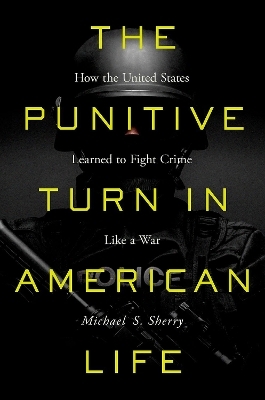
The Punitive Turn in American Life
How the United States Learned to Fight Crime Like a War
Seiten
2020
The University of North Carolina Press (Verlag)
978-1-4696-6070-7 (ISBN)
The University of North Carolina Press (Verlag)
978-1-4696-6070-7 (ISBN)
Offers a political and cultural history of the ways in which punishment and surveillance have moved to the centre of American life and become imbued with militarized language and policies, chronicling the United States' slide into becoming a meaner, punishment-obsessed nation.
In 1965, President Lyndon Johnson insisted that ""the policeman is the frontline soldier in our war against crime,"" and police forces, arms makers, policy makers, and crime experts heeded this call to arms, bringing weapons and practices from the arena of war back home. The Punitive Turn in American Life offers a political and cultural history of the ways in which punishment and surveillance have moved to the center of American life and become imbued with militarized language and policies. Michael S. Sherry argues that, by the 1990s, the ""war on crime"" had been successfully broadcast to millions of Americans at an enormous cost--to those arrested, imprisoned, or killed and to the social fabric of the nation--and that the currents of vengeance that ran through the punitive turn, underwriting torture at home and abroad, found a new voice with the election of Donald J. Trump. By 2020, the connections between war-fighting and crime-fighting remained powerful, evident in campaigns against undocumented immigrants. Stoked by ""forever war,"" the punitive turn endured even as it met fiercer resistance.
From the racist system of mass incarceration and the militarization of criminal justice to gated communities, public schools patrolled by police, and armies of private security, Sherry chronicles the United States' slide into becoming a meaner, punishment-obsessed nation.
In 1965, President Lyndon Johnson insisted that ""the policeman is the frontline soldier in our war against crime,"" and police forces, arms makers, policy makers, and crime experts heeded this call to arms, bringing weapons and practices from the arena of war back home. The Punitive Turn in American Life offers a political and cultural history of the ways in which punishment and surveillance have moved to the center of American life and become imbued with militarized language and policies. Michael S. Sherry argues that, by the 1990s, the ""war on crime"" had been successfully broadcast to millions of Americans at an enormous cost--to those arrested, imprisoned, or killed and to the social fabric of the nation--and that the currents of vengeance that ran through the punitive turn, underwriting torture at home and abroad, found a new voice with the election of Donald J. Trump. By 2020, the connections between war-fighting and crime-fighting remained powerful, evident in campaigns against undocumented immigrants. Stoked by ""forever war,"" the punitive turn endured even as it met fiercer resistance.
From the racist system of mass incarceration and the militarization of criminal justice to gated communities, public schools patrolled by police, and armies of private security, Sherry chronicles the United States' slide into becoming a meaner, punishment-obsessed nation.
Michael S. Sherry is the Richard W. Leopold Professor of History Emeritus at Northwestern University.
| Erscheinungsdatum | 15.01.2021 |
|---|---|
| Zusatzinfo | 6 halftones |
| Verlagsort | Chapel Hill |
| Sprache | englisch |
| Maße | 155 x 235 mm |
| Gewicht | 600 g |
| Themenwelt | Geisteswissenschaften ► Geschichte ► Regional- / Ländergeschichte |
| Sozialwissenschaften ► Politik / Verwaltung ► Politische Theorie | |
| Sozialwissenschaften ► Soziologie | |
| ISBN-10 | 1-4696-6070-9 / 1469660709 |
| ISBN-13 | 978-1-4696-6070-7 / 9781469660707 |
| Zustand | Neuware |
| Informationen gemäß Produktsicherheitsverordnung (GPSR) | |
| Haben Sie eine Frage zum Produkt? |
Mehr entdecken
aus dem Bereich
aus dem Bereich
Erinnerungen
Buch | Softcover (2024)
Pantheon (Verlag)
16,00 €


